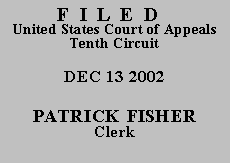

|
UNITED STATES OF AMERICA, |
|
Before KELLY, McKAY, and MURPHY, Circuit Judges.
This case is before the court on Tommie L. Johnson's pro se request for a certificate of appealability ("COA"). Until Johnson obtains a COA, he cannot appeal the district court's denial of the motion to vacate, set aside, or correct sentence he brought pursuant to 28 U.S.C. § 2255. See 28 U.S.C. § 2253(c)(1)(b) (providing that a petitioner may not appeal the denial of a § 2255 motion unless he first obtains a COA).
In 1999, Johnson was convicted of one count of possession with intent to distribute cocaine base. His conviction was affirmed by this court. See United States v. Johnson, No. 99-3225, 2000 WL 505250 (10th Cir. April 27, 2000) (unpublished disposition). Thereafter, Johnson filed the instant § 2255 motion with the United States District Court for the District of Kansas. In the motion, Johnson alleged that his conviction and sentence are contrary to Apprendi v. New Jersey, 530 U.S. 466 (2000). He also asserted that his counsel was ineffective for failing to raise the Apprendi issue. The district court denied Johnson's § 2255 motion, concluding that Apprendi does not apply retroactively to cases on collateral review and that Johnson's ineffective assistance claim lacked merit because Johnson failed to make a credible showing that his counsel's performance was deficient.
Johnson did not raise an Apprendi-type claim in his direct appeal and this court has held that Apprendi is not retroactively applicable to initial habeas petitions. See United States v. Mora, 293 F.3d 1213, 1218 (10th Cir. 2002). Consequently, Johnson's Apprendi claims are foreclosed by circuit precedent. Likewise, Johnson's argument that the failure to allege a drug quantity in the indictment deprived the trial court of jurisdiction is foreclosed by Supreme Court precedent. See United States v. Cotton, 535 U.S. 625, 122 S. Ct. 1781, 1785 (2002).
Johnson also asserts that his counsel was ineffective for failing to raise the Apprendi issue either during his trial or on direct appeal.(1)
To prevail on this issue, Johnson must demonstrate that his counsel's performance fell below an objective standard of reasonableness and that he was prejudiced by counsel's deficient performance. See Strickland v. Washington, 466 U.S. 668, 687-92 (1984). At the time of Johnson's trial and his direct appeal, this court's jurisprudence was directly contrary to the holding in Apprendi. See, e.g., United States v. Reyes, 40 F.3d 1148, 1151 (10th Cir. 1994). Apprendi was decided after Johnson's conviction was affirmed on direct appeal. This court has previously held that counsel's failure to predict future developments in the law does not constitute constitutionally deficient performance. See United States v. Gonzales-Lerma, 71 F.3d 1537, 1541-42 (10th Cir. 1995) ("Clairvoyance is not a required attribute of effective representation."). Accordingly, Johnson's ineffective assistance claims fail because he has not demonstrated that his counsel's performance was constitutionally deficient.
Johnson is not entitled to a COA unless he can make "a substantial showing of the denial of a constitutional right." 28 U.S.C. § 2253(c)(2). Johnson can make that showing by demonstrating that: (1) the issues raised are debatable among jurists, (2) a court could resolve the issues differently, or (3) that the questions presented deserve further proceedings. See Slack v. McDaniel, 529 U.S. 473, 483-84 (2000). Based on our review of Johnson's request for a COA, his appellate brief, the district court's order, and the entire record before us, we conclude that the district court's disposition of Johnson's § 2255 motion is not deserving of further proceedings, debatable among jurists of reason, or subject to different resolution on appeal. Accordingly, Johnson has failed to make the required substantial showing of the denial of a constitutional right and
is not entitled to a COA. See 28 U.S.C. § 2253(c)(1)(b). This court denies Johnson's request for a COA and dismisses this appeal.
ENTERED FOR THE COURT
Michael R. Murphy
Circuit Judge
*. This order and judgment is not binding precedent, except under the doctrines of law of the case, res judicata and collateral estoppel. The court generally disfavors the citation of orders and judgments; nevertheless, an order and judgment may be cited under the terms and conditions of 10th Cir. R. 36.3.
1.Johnson's additional argument that his counsel's failure to file a petition for a writ of certiorari with the Supreme Court constitutes ineffective assistance was not presented to the district court. Consequently, we decline to address it. See McDonald v. Kinder-Morgan, Inc., 287 F.3d 992, 999 (10th Cir. 2002) ("[A]bsent extraordinary circumstances, [this court] will not consider arguments raised for the first time on appeal. This is true whether an appellant is attempting to raise a bald-faced new issue or a new theory that falls under the same general category as a previous argument."(quotations and citation omitted)). We note, additionally, that Johnson has provided no support for this argument.